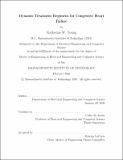Dynamic treatment regimens for congestive heart failure
Author(s)
Young, Katherine W.
Download1237567818-MIT.pdf (1.125Mb)
Other Contributors
Massachusetts Institute of Technology. Department of Electrical Engineering and Computer Science.
Advisor
Collin M. Stultz.
Terms of use
Metadata
Show full item recordAbstract
Each year, millions of patients are hospitalized with a diagnosis of congestive heart failure (CHF). This condition is characterized by inadequate tissue perfusion resulting from an inability of the heart to provide enough blood to meet the body's metabolic demands. Patients with CHF remain at a greater risk for mortality and other adverse events. A primary symptom of CHF is fluid overload ("congestion"), which is routinely treated with diuretic therapy. However, choosing a diuretic therapy that maximizes the therapeutic effects while minimizing harmful side effects remains a challenge. In order to assess a patient's response to a particular therapy and guide future treatment decisions, clinicians monitor a number of variables including a patients' vital signs, glomerular filtration rate (GFR, a measure of renal function), and fluctuations in volume status. Nevertheless, these variables are typically insufficient by themselves to ensure that a given therapy is optimal for a given patient. Current guidelines for heart failure management were developed, in part, from large clinical trials. However, it is not always clear how to apply these observations to a given patient, whose clinical characteristics may differ significantly from those of the patients in the original studies. Therefore, there is a need for methods that identify patient-specific treatments that would allow physicians to construct therapies that are truly personalized. This work describes an approach for building dynamic treatment regimens (DTRs) - a set of patient-specific treatment rules that optimize an outcome of interest. The method uses artificial neural networks to suggest diuretic doses that will improve a patient's volume status while simultaneously minimizing harmful side effects on renal function. This body of work suggests the potential that DTRs have in developing personalized diuretic regimens to improve the clinical outcomes of CHF patients.
Description
Thesis: M. Eng., Massachusetts Institute of Technology, Department of Electrical Engineering and Computer Science, February, 2020 Cataloged from student-submitted PDF of thesis. Includes bibliographical references (pages 59-60).
Date issued
2020Department
Massachusetts Institute of Technology. Department of Electrical Engineering and Computer SciencePublisher
Massachusetts Institute of Technology
Keywords
Electrical Engineering and Computer Science.